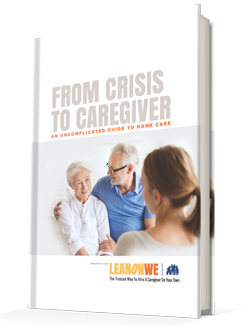3 Practical Strategies for Family Caregivers

Though providing care for an aging parent may start as a sprint, it often becomes a marathon.
Sometimes it’s a sudden illness or injury that sends you scrambling. Or maybe you’ve noticed your parents’ declining health and have been putting a care plan together for the last few months.
Whatever it is, as time goes on, caring for an aging family member can become overwhelming.
Your other day-to-day responsibilities for work, family, and community continue while caring for your loved one, and the time spent on your own health and well-being can fall by the wayside. In this guide, we’ll show you how to keep your life in balance as a family caregiver.
Family Caregiving Isn’t Easy: Why You Need These Tips
It’s not easy caring for someone you love. The sudden shift in dynamics in the relationship with your parents can be jarring, not to mention the workload of driving your mother around, helping your father clean his house, or preparing meals.
For family caregivers, the stress can even impact their health and physical well-being. A Blue Cross Blue Shield survey measuring the effects of unpaid caregiving found:
- Family caregivers experience a 26% greater impact of physical and mental conditions that could lower their overall health.
- Family caregivers have reported an increase in feeling stressed, isolated, and lonely.
- Family caregivers are at greater risk of serious health conditions, including adjustment disorder, anxiety, major depression, tobacco use disorder, obesity, and hypertension.
It’s not that you can’t be there for a loved one, but you need to make sure that you take care of yourself, too. There’s no need to feel guilty about that either; to care for your loved one, you need to be at your best. Read on for three practical strategies to help maintain your balance and your relationship with your senior.
» Download our free guide to home care, "From Crisis to Caregiver."
3 Strategies For Family Caregivers
Caring for a loved one may start with a sprint but often becomes a marathon. Follow these three tips to manage stress and ensure your senior gets the care he or she needs:
- Focus on your relationship
- Know your limits
- Ask for help
We’ll walk you through each one in depth.
Focus On Your Relationship
Watching someone you love lose their ability to do the things they once enjoyed can be emotionally draining – and providing the physical care needed to meet their basic needs can be physically exhausting. To ease the strain, take time to focus on your relationship rather than just the caregiving.
Find simple ways to do the things you’ve always enjoyed together, whether that’s listening to music, sitting outside on a beautiful day, or doing some aspect of a favorite hobby. Remember that your loved one is also experiencing a sense of loss. Involving him in whatever small decisions or tasks he can handle keeps him engaged and feeling needed. And focusing on shared interests or memories lets both of you reconnect on a more personal level.
Know Your Limits
It’s important to recognize when you’ve reached your limit. If you’re feeling overwhelmed, it’s time to “H-A-L-T.”
An acronym for “hungry, angry, lonely, or tired,” this tried-and-true formula is a reminder to notice whether you’re hungry, angry, lonely, or tired. If you can pinpoint the cause of your stress, it’s easier to get the care you need.
Be sure to make time for your other relationships, for exercise, and for some alone time. A few quiet moments for meditation, prayer, exercise, or positive thinking can go a long way toward restoring your peace of mind. Lowering your expectations also helps. Rather than letting an untidy house or your senior’s new limitations upset you, try to simplify, accept imperfection, and move on.
Ask for Help
Don’t forget to ask for help when you need it. If finances are a concern, discuss them openly with other family members. Family and friends may also be able to pitch in with meals and transportation.
Also, be sure to explore the many respite care options available. Adult daycare centers allow seniors to get out of the house and interact with their peers for several hours, while some assisted living communities offer care overnight or for a few days at a time.
You can also hire an in-home caregiver for anything from a few hours a week to several hours every day or even live-in coverage. By delegating some of the tougher aspects of care to a caregiver, you’ll have more energy left to enjoy the good times with your loved one.
Thinking About Home Care? Download Our Free Guide “From Crisis to Caregiver”
Caring for a loved one is not always easy, but with these three tips, it does not need to be impossible either.
At some point, you may need to bring in extra help. If the thought of hiring a caregiver makes you feel overwhelmed, we recommend downloading our free eBook, “From Crisis to Caregiver: An Uncomplicated Guide to Home Care.”
This eBook discusses the ins and outs of hiring a caregiver, arming you with a trustworthy resource to make the best decision for your loved one. Our eBook takes a no-nonsense look at:
- The realities of financing senior care
- Straight talk about the pros and cons of the three common home care options
- Our own stories of hiring caregivers as a way to highlight the unexpected pitfalls you’ll want to avoid
Click the button below to download the free guide and take the first step toward approaching the hiring process with confidence and peace of mind.

